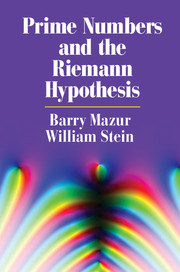Preface
Published online by Cambridge University Press: 05 May 2016
Summary
The Riemann Hypothesis is one of the great unsolved problems of mathematics, and the reward of $1,000,000 of Clay Mathematics Institute prizemoney awaits the person who solves it. But – with or without money – its resolution is crucial for our understanding of the nature of numbers.
There are several full-length books recently published, written for a general audience, that have the Riemann Hypothesis as their main topic. A reader of these books will get a fairly rich picture of the personalities engaged in the pursuit, and of related mathematical and historical issues.
This is not the mission of the book that you now hold in your hands. We aim – instead – to explain, in as direct a manner as possible and with the least mathematical background required, what this problem is all about and why it is so important. For even before anyone proves this hypothesis to be true (or false!), just getting familiar with it, and with some of the ideas behind it, is exciting. Moreover, this hypothesis is of crucial importance in a wide range of mathematical fields; for example, it is a confidence-booster for computational mathematics: even if the Riemann Hypothesis is never proved, assuming its truth (and that of closely related hypotheses) gives us an excellent sense of how long certain computer programs will take to run, which, in some cases, gives us the assurance we need to initiate a computation that might take weeks or even months to complete. Here is how the Princeton mathematician Peter Sarnak describes the broad impact the Riemann Hypothesis has had:
“The Riemann hypothesis is the central problem and it implies many, many things. One thing that makes it rather unusual in mathematics today is that there must be over five hundred papers – somebody should go and count – which start ‘Assume the Riemann hypothesis,’ and the conclusion is fantastic. And those [conclusions] would then become theorems. . . With this one solution you would have proven five hundred theorems or more at once.”
So, what is the Riemann Hypothesis? Below is a first description of what it is about. The task of our book is to develop the following boxed paragraph into a fuller explanation and to convince you of the importance and beauty of the mathematics it represents.
- Type
- Chapter
- Information
- Prime Numbers and the Riemann Hypothesis , pp. vii - xiiPublisher: Cambridge University PressPrint publication year: 2016



